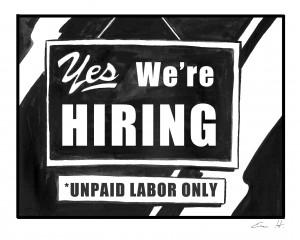
Take a look at the list of accomplishments college students want to make before graduating, and it’s guaranteed obtaining an internship is on there.
The number one benefit of an internship is acquiring real-world experience in the field because nothing beats experience and professionalism in the workplace. Getting a foot in the door of a potential employer and gaining valuable contacts for networking purposes are other benefits.
Unfortunately, in many fields, having an internship doesn’t always mean gainful employment. Fifty-five percent of college graduates were involved with an internship while working toward a degree, according to the National Association of Colleges and Employers. That’s double what it was 20 years ago. Many jobs and colleges/universities require students to have at least one internship prior to graduating, which contributes to the overwhelming increase.
While interns usually fare better than non-interns in landing a job, paid interns are 25 percent more likely to be hired than unpaid interns because paid interns are more likely to spend time on professional duties while unpaid interns are likely to spend their time on clerical and less-relevant duties.
The unfortunate reality is paid internships are hard to come by. Students are eager to gain any relevant experience they can, even if it means foregoing a biweekly paycheck. Many companies know this and think, “Why pay interns if they’re willing to work for free?”
In recent months, former interns have filed lawsuits against major corporations such as Condé Nast and Warner Music Group on the grounds that they were underpaid, if at all. As a result, many corporations have lost a considerable amount of money from courts ordering them to pay previous interns for their work. Since then, some corporations have restricted the amount of paid internships they offer. The lack of available paid internships doesn’t make employers less inclined to hiring those with experience prior to graduation.
Unpaid internships are not necessarily better than no internship at all, though. The National Association of Colleges and Employers found that 63 percent of job seekers with a paid internship under their belt received at least one job offer while only 37 percent of former unpaid interns received a job offer. Many colleges/universities accept unpaid internships as credit toward a student’s degree. However, even that is beginning to change. Yale University does not award credit for any internship, and according to the university’s website, this policy is shared with all Ivy League institutions.
The economics of internships are unfair. Students willingly accept an unpaid internship with the expectation that if they prove themselves, they will reap the benefits, yet many employers take one look at an applicant’s resume, see an unpaid internship listed and file the application under “unqualified.” The only acceptable unpaid internship is one with a nonprofit company, and even then, course credit should be offered.
It’s a well-known fact that when people feel they are appropriately compensated, they perform better. The organizations cutting back on internships simply because they’re too greedy to pay someone to get the work done could potentially miss out on the opportunity to groom their interns into productive employees who could bring in big revenue.
Organizations who do not pay interns should still provide them with chances to gain relevant experience and hone whatever skills are necessary for employment.
Paid or not, companies should take more steps to ensure interns reap the benefits of the work they put in.

























